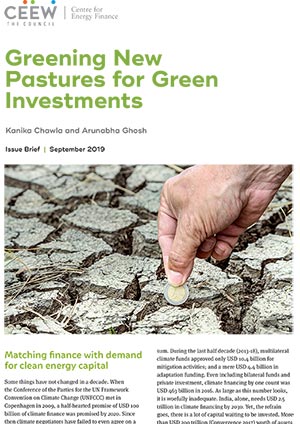Greening New Pastures for Green Investments
PublicationsThe CEEW Centre for Energy Finance (CEEW-CEF) has released an independent study ‘Greening New Pastures for Green Investments‘ highlighting the need for green capital at scale to accelerate the energy transition.
More than USD 200 trillion worth of assets are under management in the world’s pension funds, insurance firms and sovereign wealth funds. Yet, the greatest challenge of our times – confronting climate change, especially in the most vulnerable countries – does not find enough suitors. The upcoming UN Climate Action Summit must demand committed action to build the conduits via which capital can flow from the Global North to the Global South.
Key findings
- There is a strong and stubborn link between the income levels of an economy and its energy investment. Lower-middle and low-income countries, which account for 40% of the world’s population, get less than 15% of energy investment.
- The cost of finance for renewable energy is extremely high for emerging economies. For example, in countries such as India, financing costs account for the largest component of renewable energy tariffs – between 50 and 65 per cent.
- Capital is not moving from capital-rich to capital-poor regions. While India has been averaging about USD 10.5 billion a year in clean energy investments, it needs three times that number annually, just for the energy transition.
- A decade of inaction on climate finance has convinced emerging economies that one shade of green capital in the form of multilateral or bilateral development assistance is neither adequate nor forthcoming.
- Instead, different shades of green capital such as institutional investors, venture capitalists, private equity players, etc. need to find their way into diversified portfolios of projects, within and across countries.
- A more literate, more informed, and a more innovative conversation on climate finance and energy finance with the right actors is needed for enhanced ambitions for climate action.
Key recommendations
The CEEW-CEF study makes three recommendations for facilitating enhanced flows of private capital from the Global North to the Global South. These include:
- Establishing a Climate and Clean Energy Finance Commission to accelerate the energy transition in emerging countries. The Commission could comprise climate and clean energy practitioners and thought leaders from the Global South, which would be convened to join existing task-forces on climate finance convened by the United Nations and beyond, to deliberate on the means of mobilising finance specifically for emerging markets.
- In order to facilitate learning between middle-income countries, the study recommends launching an Africa-India Clean Energy Co-Learnings Programme that would enable business-to-business exchanges between leading players in these markets. It would also result in the creation of a more aggregated market whereby emerging economies would have greater collective bargaining power as price-makers rather than price-takers.
- Reduce information asymmetries between clean energy project developers, on one hand, and prospective investors, on the other.

